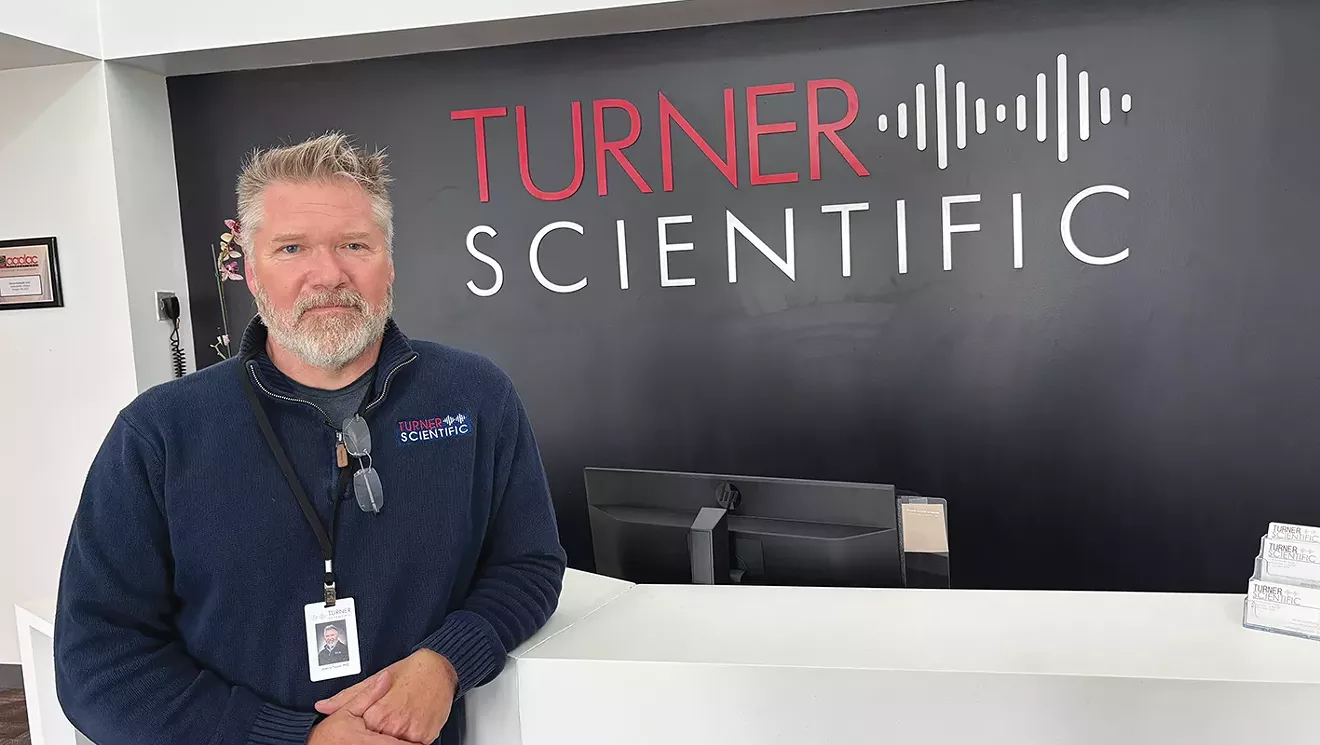
PHOTO BY LYNN WHALEN
Dr. Jeremy Turner, founder and CEO of Turner Scientific, at the front entrance of the company’s new facility in Jacksonville. The business recently moved to a facility at 1275 Sandusky Road that is five times larger than its previous headquarters.
Tucked away on the north edge of Jacksonville, surrounded by farm fields, sits a large facility where a small team assembles the Sensory Sentinel, a game changer in the field of biomedical research.
“It’s the only instrument like it in the world,” said Dr. Jeremy Turner, founder and CEO of Turner Scientific and former faculty member at Southern Illinois University School of Medicine and Illinois College.
The Sensory Sentinel, just approved for a U.S. patent, monitors and improves the comfort and welfare of lab animals and the reliability of research projects.
“In biomedical research, every major university, pharmaceutical or biotech company will have live animals on hand for their work,” Turner said. “Whether they’re testing, for instance, a new Alzheimer’s medicine or memory loss drug, it’s going to involve animals. Our expertise is understanding what those animals sense and how that affects their welfare and the experiments they’re involved in.”
Over the course of his company’s research on hearing loss over the last 15 years, Turner saw the need for better monitoring of lab animals. While regulations call for monitoring of temperature, humidity and lighting in rooms where lab animals are kept, he knew that sounds and vibrations also affect the animals and experiments.
“We developed this tool that’s easy to use to monitor all of those conditions. They don’t have to be an expert to measure whether the mice, rats, guinea pigs or whatever they’re using, are in an environment that’s safe and non-stressful for them.
“It’s all about making sure lab environments are tuned to that species, because animals hear, see, smell and feel things that humans don’t. A typical facility could have thousands of cages of lab animals. We affix sensors in the cages and monitor what these animals experience in their home environment,” he said.
Turner explained that a construction project near a research facility, or even a lab technician turning on a light at the wrong time, can stress a lab animal and skew research results. “If you’re testing a drug’s effect on blood pressure, for example, but a lab animal is stressed by a sound or vibration in its cage, that could cause a spike in the animal’s blood pressure and ruin the day’s research. We’re there on behalf of the animals and to make sure the science stays stable,” Turner said.

PHOTO BY LYNN WHALEN
J.R. Manker, left, and Dr. Jeremy Turner at the Sensory Sentinel monitoring hub at Turner Scientific’s Jacksonville headquarters, where data is tracked from animal lab research facilities around the globe.
Customers for the Sensory Sentinel system include veterinarians, research universities, pharmaceutical companies and private research firms around the world. Each unit costs $15,000 plus a $1,000 annual software fee, and between 200 to 300 complete systems are sold per year.
Turner and director of monitoring J.R. Manker travel across the country and abroad to set up the systems and consult on their use. Data from the systems is sent back to a monitoring hub where Turner Scientific employees watch for changes and send out alerts if conditions are causing stress in the lab animals.
Manker also travels to construction sites near research facilities to act as a bridge between construction companies and researchers and ensure that noise and vibrations won’t affect medical research. “It’s all about communication when researchers are worried that years of work can be ruined if the lab animals are stressed by construction noise and vibrations,” Manker said. “We work to find solutions that work for both parties.”
Sensory Sentinel now generates half of the revenue at Turner Scientific. The other half is its original mission of hearing loss research. The company’s scientists test drugs for their impact on hearing.
“Thirty-four percent of current prescription drugs carry potential side effects involving loss of hearing, balance or ringing in the ear,” said Turner. “We use rats, mice, guinea pigs and mini-pigs to test drugs for safety and hearing equipment including the next generation of cochlear implants.”
And of course, the company uses the Sensory Sentinel system to make sure the lab animals are kept comfortable and stress-free.
Turner said his company is the only one in the U.S. heavily investing in developing the miniature pig as a model for hearing. Turner Scientific was awarded a $1.7 million National Institutes of Health small business grant last fall to use mini-pigs in hearing research.
“We’re actually teaching the pigs to swipe a tablet when they hear a sound so we can eventually use this as a hearing test,” said Turner. “We’ve found the pigs like to swipe left and right but not up and down.”
Turner Scientific recently held a ribbon cutting ceremony to mark its move from a 12,000-square-foot headquarters to a 60,000-square-foot-facility at 1275 Sandusky Road which formerly housed several insurance processing companies. Turner has 26 employees in Jacksonville and six working remotely in Houston, Philadelphia, Boston, Atlanta and Florida.
According to Turner, the company has grown 20%-50% each year for the past eight years. He said the company is currently on track to match last year’s revenue, but uncertainty over federal cuts in research grants and tariffs is causing some potential customers to hold off on spending.
“Everyone we talk to wants our product,” said Manker. “But right now, it’s usually a budget issue. We hope it’s a temporary blip in spending.”


